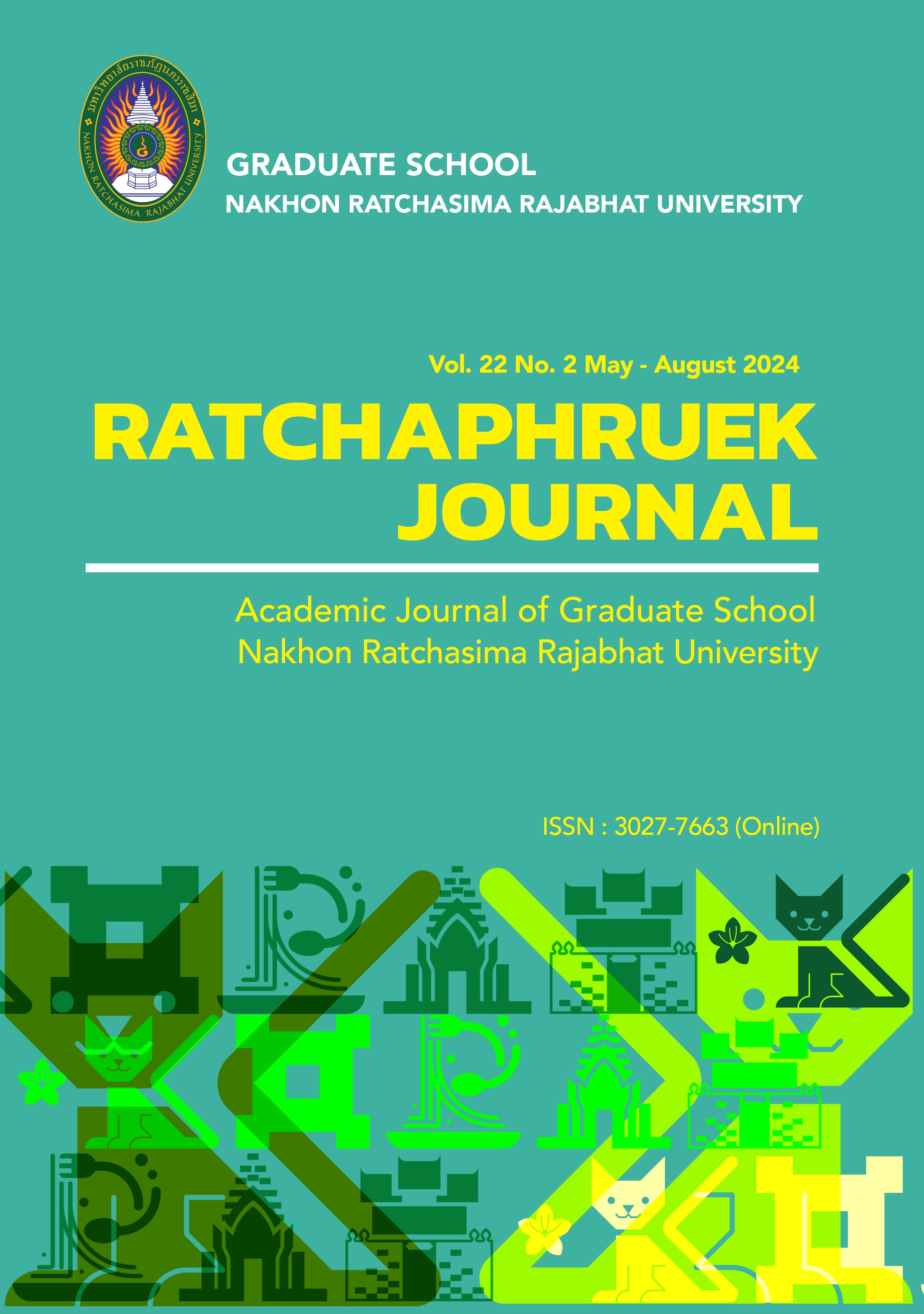Natural Resource Management Plan to Support Climate Change: A Case Study of Forest Resources in the Lam Takhong Watershed, Nakhon Ratchasima
Main Article Content
Abstract
The purpose of this study is to propose a natural resource management plan to support climate change, specifically focusing on forest resources in the Lam Takhong Basin area, Nakhon Ratchasima Province. This qualitative research categorizes the abundance of forest resources into three levels: high fertility, medium fertility, and low fertility. The study includes the sub-districts of Pakchong, Kham Thale So, and Chaleom Phra Kiat in Nakhon Ratchasima Province. The units used for analysis were: 1) group level, consisting of 30 household representatives and community leader representatives, 2) organizational level, including 2 provincial level organizations and 3 local level organizations. Data collection methods included group interviews and in-depth interviews using semi-structured interview guidelines, alongside participant interviews and participant observations conducted between July 2019 and April 2020. Data were analyzed and presented using descriptive analysis.
The results showed that a natural resource management plan to support climate change for the forest resources in the Lam Takhong Basin area, Nakhon Ratchasima Province consists of 1) a forest resource utilization plan, 2) a forest resource conservation plan, 3) a forest resource restoration plan, 4) a forest resource supervision and control plan, 5) a public participation plan in forest natural resources utilization, and 6) a plan for improving the efficiency of forest natural resources utilization.
Article Details

This work is licensed under a Creative Commons Attribution-NonCommercial-NoDerivatives 4.0 International License.
References
กรมป่าไม้. (2561). ชั้นข้อมูลระบบสารสนเทศภูมิศาสตร์พื้นที่ป่าไม้ในพื้นที่ลุ่มน้ำลำตะคอง. กรุงเทพฯ: กระทรวงทรัพยากรธรรมชาติและสิ่งแวดล้อม.
สำนักงานคณะกรรมการพัฒนาการเศรษฐกิจและสังคมแห่งชาติ. (2559). แผนพัฒนาการเศรษฐกิจและสังคมแห่งชาติ ฉบับที่ 12 (พ.ศ. 2560-2564). สืบค้นเมื่อ 14 เมษายน 2563, จาก www.nesdb.go.th/ewt_dl_link.php?nid=6422.
สำนักงานทรัพยากรน้ำ ภาค 5. (2553). ยุทธศาสตร์การบริหารจัดการทรัพยากรน้ำและลุ่มน้ำลำตะคอง แบบบูรณาการ. นครราชสีมา: ผู้แต่ง.
สํานักงานนโยบายและแผนทรัพยากรธรรมชาติและสิ่งแวดล้อม กระทรวงทรัพยากรธรรมชาติและสิ่งแวดล้อม. (2558). แผนแม่บทรองรับการเปลี่ยนแปลงสภาพภูมิอากาศ พ.ศ. 2558-2593. สืบค้นเมื่อ 19 พฤศจิกายน 2561, จาก www.deqp.go.th
สำนักงานสภาพัฒนาการเศรษฐกิจและสังคมแห่งชาติ. (2560). ยุทธศาสตร์ชาติ ระยะ 20 ปี (พ.ศ. 2561-2580). สืบค้นเมื่อ 26 มีนาคม 2567, จาก https://www.nesdc.go.th/ download/document/SAC/NS_SumPlanOct2018.pdf
Brandt, J. S. & Buckley, R. C. (2018). A global systematic review of empirical evidence of ecotourism impacts on forests in biodiversity hotspots. Current Opinion in Environmental Sustainability, 32, pp. 112-118.
Butt, S., Smith, S. M., Moola, F., & Conway, T. M. (2021). The relationship between knowledge and community engagement in local urban forest governance: A case study examining the role of resident association members in Mississauga, Canada. Urban Forestry & Urban Greening, 60, 127054.
Mbeche, R., Ateka, J., Herrmann, R., & Grote, U. (2021). Understanding forest users' participation in participatory forest management (PFM): Insights from Mt. Elgon forest ecosystem, Kenya. Forest Policy and Economics, 129, 102507.
Pawar, K. V. & Rothkar, R. V. (2015). Forest conservation & environmental awareness. Procedia Earth and Planetary Science, 11, pp. 212-215.
Rusinamhodzi, M. G., & Thiel, A. (2020). Property rights and the conservation of forests in communal areas in Zimbabwe. Forest Policy and Economics, 121,. Retrieved July 21, 2021, from, https://www.sciencedirect.com/science/article/abs/pii/ S1389934118305355
Thompson, S. T., & Magrath, W. B. (2021). Preventing illegal logging. Forest Policy and Economics, 128, Retrieved July 2, 2021, from, https://doi.org/10.1016/j.forpol. 2021.102479
Von Mirbach, M. & Huemer, C. (2003). Forests, climate change and carbon reservoirs: opportunities for forest conservation. A Sierra Club of Canada Discussion Paper. Canada: (n.p.).


